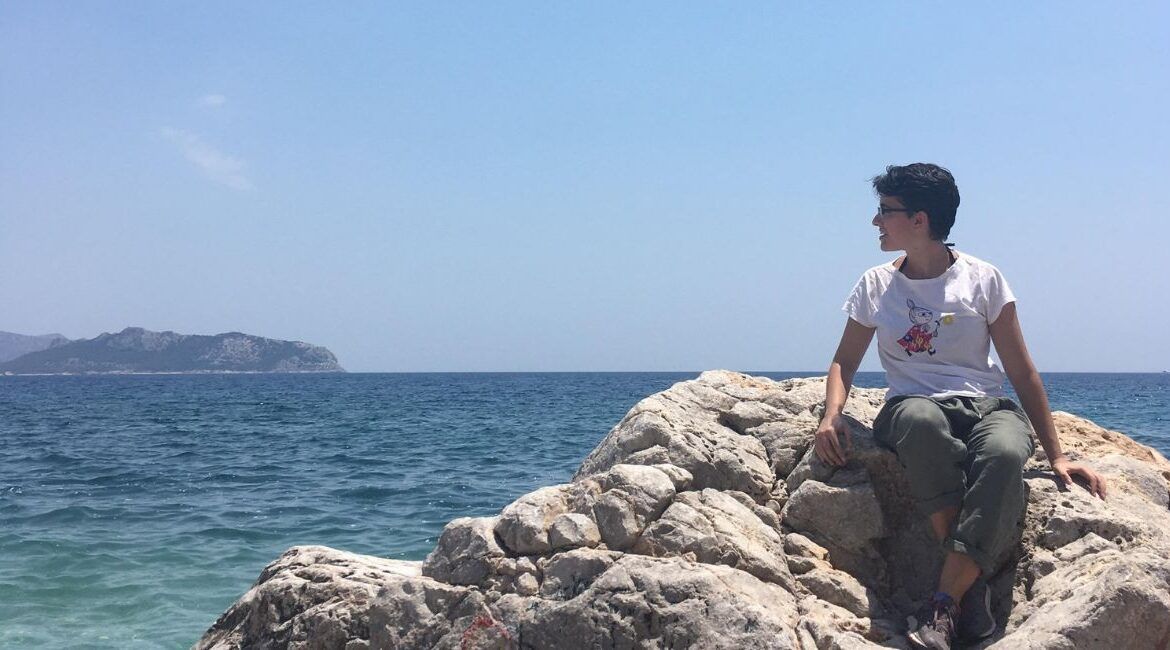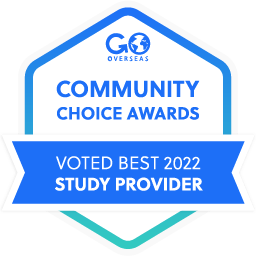
Staying for the Summer (Part 1 of 2)
For the first time, we’ve had spring semester students stay for the summer doing internships with various organizations. Follow along as we interviewed two of these students about their summers in Greece and how other students can follow suit. This first student is Rose Hatem, a CYA Spring 2019 student who stayed in Athens to do an internship with the Athens City Museum. Here’s what Rose had to say about staying for the summer.
Tell me about yourself?
I am a rising senior (2020) at Smith College, in Northampton, Mass, and I’m from Yonkers, NY. I’m majoring in Classics (Greek specifically) and also study Psychology and Museum Studies. I did CYA in spring 2019 and took Advanced Ancient Greek with professor Kritsotakis, Beginning Modern Greek with professor Papayianni, The Topography and Monuments of Athens with professor Pitt, and The Orthodox Church with professor Iosif. I really enjoyed all of my classes and would recommend all four of the professors.
So you stayed for the summer? How much do you intern? What do you do when you aren’t interning?
I intern four days a week, for seven hours a day. I had started volunteering at the museum during the semester, for just a couple of hours a week, which helped me get into the swing of things for the summer because I already had some ideas about projects to work on. I am living with a friend from Smith, who is also volunteering in Athens for the summer, so when I am not interning I spend a lot of time with her. We’ve traveled to different beaches, gone out to restaurants and bars, and visited other museums, which are usually free or very cheap for students! We also spend lots of time relaxing, reading, sitting on our balcony, or cooking. I have also done some English practice with a twelve-year-old Greek girl, who I met through CYA connections.
Tell me a little bit more about your internship.
It was very easy to find my internship, because of CYA’s resources. I went and talked to Nadia Meliniotis, who is the Director of Student Affairs. I explained that I wanted to intern for a museum over the summer, what my interests were, and what I would need from the internship in order to fulfill the requirements of the Museum Studies program at Smith (Smith also gave me funding, through their career office, since my work for the museum is unpaid). Nadia contacted several museums and managed to get me an interview at the Athens City Museum. Nadia made the whole process very easy for me, and any CYA student who wants a volunteer position in Athens should just go talk to Nadia as soon as possible!
 At the museum, I have learned how to give an English-language tour. But I spend most of my time working in the museum offices on different projects. For example, I have translated museum labels from Greek to English, I have scanned photos for the collection database as well as done research on some of the contents of the photos, and I have been researching other museums in Europe for the Athens City Museum to potentially collaborate with. It is a small museum, so there is a lot of variety in what I do. I would definitely recommend it to other students, especially if they are interested in Greek history. I would also say that it would be hard to do this internship if I understood no Modern Greek, and it would be easier if I understood more. Even though everyone is very kind and accommodating, and most Athenians speak English, if you are interested in any extra-curricular activities, the more Modern Greek you have learned, the better able you will be to take advantage of the opportunities.
At the museum, I have learned how to give an English-language tour. But I spend most of my time working in the museum offices on different projects. For example, I have translated museum labels from Greek to English, I have scanned photos for the collection database as well as done research on some of the contents of the photos, and I have been researching other museums in Europe for the Athens City Museum to potentially collaborate with. It is a small museum, so there is a lot of variety in what I do. I would definitely recommend it to other students, especially if they are interested in Greek history. I would also say that it would be hard to do this internship if I understood no Modern Greek, and it would be easier if I understood more. Even though everyone is very kind and accommodating, and most Athenians speak English, if you are interested in any extra-curricular activities, the more Modern Greek you have learned, the better able you will be to take advantage of the opportunities.
What is your everyday life like?
I walk or take the trolley to the museum. In the evenings, I do my grocery shopping or work out at the gym in Pangrati. I love living in Pangrati–it feels very accessible and convenient, and it has a lot of great bar/cafes, shops, and tavernas, but at the same time it is still quiet and peaceful, especially since I live on a small side street. I’m also trying to explore other neighborhoods in Athens more than I did during the semester–like Psyrri, Kolonaki, and Plaka, each one has its own distinct personality! And I have been traveling around the area–last weekend I took a bus to the Temple of Poseidon and the beach at Sounion, and next weekend I am taking a ferry to Agistri.
Has this allowed you an even clearer insight into Greek Culture?
Absolutely! Greece is a great place to be in the summer, and it is a really interesting place to volunteer–the attitudes towards work and vacation are very different here from the US. I’ve been using my limited Greek more since I’m not surrounded by Americans and talking more to my neighbors.
Do you have any tips for semester students looking to stay after their semester? In what ways did your semester at CYA prepare you for this venture?
I knew before I arrived that I would want to stay longer, and so I started talking to Nadia about it right away. I would say it’s important to plan in advance, but also important to be comfortable with very loose plans. Also, I would not have been able to do this without getting funding from my school, so make sure you have a clear idea of what grants your home institution makes available, or what other options for funding you could try. The connections I made with CYA staff have been super important to keeping my summer going smoothly, and of course my Modern Greek class was invaluable! I think CYA does a great job of really trying to introduce a broad spectrum of Greek culture to everyone, regardless of their major or interests, and I really appreciate that now that I am less connected to the structure of the program.
How did you go about finding housing? Do you still live in CYA housing?
Yes, I am renting from CYA. I also got the advice to look on Airbnb, but I am happy it worked out this way because I wanted to stay in the same neighborhood and know what to expect. It is nice to be able to go do my laundry and pick up my mail at CYA, ask the staff there for advice on living in Athens or dealing with any problems that come up, and just go talk to familiar faces, since the CYA staff are some of the nicest people I’ve met here in Athens!
What is different between your life now compared to when you were in classes?
Obviously, I have a lot more free time, and I haven’t been traveling much–just a few day trips around the area, as opposed to weekends in other countries and the week-long CYA trips. In a short semester, it’s hard to hit the right balance between traveling around Europe and getting to know Athens, but in general I would say that spending more time in Athens or traveling in Greece helps you get more out of CYA–although everyone who studies abroad gets a lot of conflicting advice on the topic. Over the summer I am enjoying getting a more in-depth experience of Athens, without the wide variety of travel. Since I’m not taking classes, I can’t say that I’m studying in Athens anymore, so I have to say that I’m living in Athens. That feels different!
What is the best part about staying after?
It is nice to feel like I have the time to repeat experiences, rather than constantly trying to do something new. There is so much to do in Athens, and I could find something different every day, but building and settling into a routine here has been more satisfying for me. It helps that Athens is cheap for a European capital, and so you can stay busy and go out while sticking to a budget.
What is something new you learned by staying here for the summer?
This is a generalization, but Greek people are way less competitive and stressed out than most of the Americans I know. I noticed this during the semester, but I feel it even more now that I have fewer Americans to spend time with. I’m not sure how much this has changed my attitude, but it is a nice example to have, and valuable to see how you can approach problems very differently, but still get them solved.
How did you go about making new friends after your classmates left?
Good question! Like I said before, I have a friend from Smith who is also here for the summer, and we are sharing an apartment, so I honestly haven’t tried very hard to make new friends because I’m here with one of my best friends. I do talk to my Greek neighbors (I really bonded with my building manager after an episode in which my laundry fell four stories off my balcony into an enclosed courtyard) and the other volunteers at the museum. In theory, I would say that a structured activity like an internship is the best way to meet people in a new place, but a small museum of nineteenth-century history is not the best place to meet other young people. And I’ve also been enjoying spending time by myself–I think one of the best things about studying abroad is the opportunity to spend time alone and even travel alone.
Any plans to come back to Greece after this Summer?
Nothing concrete (my first plan is to start saving money again!) but I know that I’ll be back some time. I would love to spend more time on the islands–I never made it to Crete–and I would also really like to go back to Thessaloniki.
Logistically how did it work? Did you have to get a new visa?
I didn’t! When I got my visa in Boston, I told the woman at the consulate that I wanted to stay until August, but she would not extend my visa for that long. My visa expired at the end of June, but I am allowed to stay in the E.U. for up to 90 days after the expiration date. Other logistics were easy, since I rented from CYA and Popi Baloglu, the Housing Director, helped me with storing my luggage before I moved. I bought a one-way flight when I came to Greece, and I only bought my return flight a few weeks ago. I would recommend buying a one-way ticket to anyone studying abroad (it can be pretty cheap if you use websites like STA travel or kayak), because you can always find a reason to stay!






